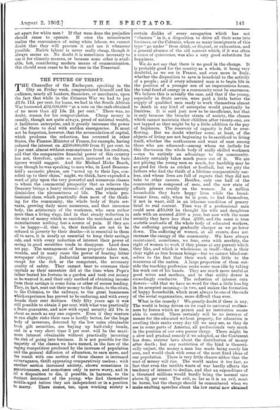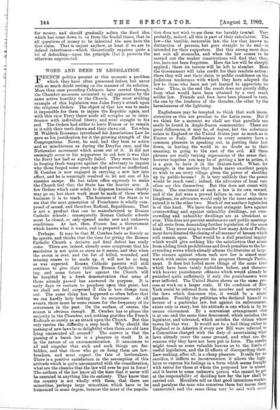THE .b uTURE OF THRIFT. T HE Chancellor of the Exchequer,
speaking in the City on Friday week, congratulated himself and his audience, nearly all bankers, financiers, or merchants, upon the fact that while in the Crimean War we had to .pay .23 6s. 11d, per cent. for loans, we had in the South African War borrowed .292,000,000 "at a rate on the cash obtained of no more than £2 13s. 2d. per cent." There was, no doubt, reason for his congratulation. Cheap money is usually, though not quite always, proof of national wealth, it facilitates enterprise, and it greatly increases the power of the State to deal with sudden emergencies. It must not be forgotten, however, that the accumulation of capital, which produces the reduction, has occurred in other States, the Finance Minister of France, for example, having reduced the interest on £250,000,000 from 31 per cent. to 3 per cent. almost without remonstrance from his creditors, and that the comparative financial power of this country has not, therefore, quite so much increased as the bare figures would suggest. And Sir Michael Hicks Beach, even though he was speaking to men who, in Lord Beacons- field's sarcastic phrase, are " acred up to their lips, con- soiled up to their chins," might, we think, have expended a word of pity upon the very powerful and numerous classes to whom the commercial prosperity that so relieves the Treasury brings a heavy increase of care, and permanently diminishes the pleasantness of life. The whole pro- fessional class, which practically does most of the think- ing for the community, the whole body of State ser- vants, growing daily more numerous, and that immense body, the _aristocracy of the workmen, who earn rather more than a living wage, find in that steady reduction in the rent of money which so enriches the merchant and the manufacturer nothing but a source of pain. If they are to be happy—if, that is, their families are not to be reduced to poverty by their deaths—it is essential to them all to save, it is nearly as essential to keep their savings safe, and with every reduction of interest their power of saving in good securities tends to disappear. Land does not pay. The management of house property takes time, trouble, and in many cases the power of bearinc, bitter in newspaper obloquy. Industrial vestments have not, except for the rich or the competent, the necessary quality of safety. They cannot bear to consume their capitals as their ancestors did at the time when Pope's father buried his fortune in a garden and took out money as he wanted it, and their only method of obtaining income from their savings is some form or other of secure lending. They, in fact, rent out their money to the State, to the cities, to the Colonies, to the railways, to the great businesses which experience has proved to be enduring, and with every decade their rent declines. Only fifty years ago it was still possible to obtain 5 per cent. with what was practically a State guarantee, and now with equal security .22 18s. is about as much as any one expects. Even if they venture to run slight risks their case is hardly better, for the huge body of investors, deterred by the low rates obtainable from gilt securities, are buying up half-risky bonds, and in a very short time 3 per cent. will be the maxi- mum interest obtainable without practically incurring the risk of going into business. It is not possible for the majority of the classes we have named, in the face of the raging competition produced by the increase of population and the general diffusion of education, to earn more, and the result with one section of those classes is increased extravagance, thrift appearing comparatively useless ; with another section increased anxiety, shown sometimes in Penuriousness, and sometimes only in nerve worry, and in all a disposition to die, if possible, in harness, to the distinct detriment of the young, who find themselves middle-aged before they are independent or in a position to marry. There comes, too, upon working society a certain dislike of every occupation which has not " chances " in it, a disposition to drive all their sons into business, or the Colonies, where so many immigrants of this type" go under" from drink, or disgust, or exhaustion, and a general absence of the old content which, if it was often a cause of quiescence, was also a very good substitute for happiness.
We do not say that there is no good in the change. It is probably good for the country as a whole, it being very doubtful, as we see in France, and even more in Italy, whether the disposition to save is beneficial to the activity of a people ; and if every educated man is to begin life in the position of a younger son of an impecunious house, the total fund of energy in a community must be enormous. We believe this is actually the case, and that if the young, especially in State service, were paid a little better the supply of qualified men ready to work themselves almost to death in any kind of enterprise would practically be limitless. It is said just now to be insufficient, but that is only because the broader strata of society, the classes which cannot maintain their children after twenty-one, are not tapped as they might be by a little addition to the pay of beginners. The reservoir of capacity is full to over- flowing. But we doubt whether some, at least, of the objects of living are not beginning to be sacrificed to living itself, whether the restlessness and want of ease among those who are educated—among whom we include for this discussion the whole body of really skilled workmen —can be entirely an advantage to the community. Anxiety certainly takes much peace out of it. We are not pitying the young men so much, for hardship may be as good for them as cricket or football, but we pity the fathers who find the thrift of a lifetime comparatively use- less, and whose lives are full of regrets that they did not take to other careers. Besides, only one half of the community is composed of men, and the new state of affairs presses cruelly on the women. In a million households they have happy lives while the bread- winner lives, only, when he is gone, to find themselves, if not in want, still in an irksome condition of penury fatal to real content. Time was if a professional man could save .210,000 he thought his wife and daughters safe with an assured £500 a year, but now with the same security they have less than .2300, and the same is true mutatis mutandis of the whole body of educated workers, the suffering growing gradually sharper as we go lower down. The suffering of women, at all events, does not increase the energy of the community. We have always maintained, sometimes, we fear, even with acerbity, the right of women to work if they please at any pursuit which they like, and which is wholesome in itself—that is their clear right as free human beings—but we cannot blind our- selves to the fact that their work adds little to the resources of the nation. A large proportion of them out- side the teaching profession make some man idle by taking his work out of his hands. They are much more useful as good wives and mothers, and to that utility dower is exceedingly conducive. The reduction of interest cuts dowers—odd that we have no word for that a little less big in its accepted meaning—in two, and makes the formation of happy households, which must always be one of the ends of the social organisation, more difficult than ever.
What is the remedy ? We greatly doubt if there is any. The world is being driven on its road to universal restless- ness by forces which no person and no institution seems able to control. There certainly will be no increase of means for the educated without property, for education is swelling their ranks every day till we may see, as they do see in some parts of America, all professionals very much in the position of our own poorer clergy. There might be a slow and gradual remedy if we adopted, as the Continent has done, stricter laws about the distribution of money after death ; but any restriction of the kind is theoreti- cally unjust, the money a man has made being surely his own, and would clash with some of the most fixed ideas of our population. There is very little chance either that the rent of money will rise. The world makes it too fast, so fast that even the terrible waste of war hardly affects the tendency of interest to decline, and that an expenditure of a thousand millions would hardly bring the normal rate above ai per cent. The evil, so far as it is an evil, must be borne, but the change should be remembered when we make exulting speeches about the low rental now obtained for money, and should gradually soften the fixed idea which has come down to us from the feudal times, that in all ,questions of money to be inherited the men have the first claim That is unjust anyhow, at least if we are to defend inheritance—which theoretically requires quite a lot of defending—upon the principle that it protects the otherwise unprotected.







































 Previous page
Previous page